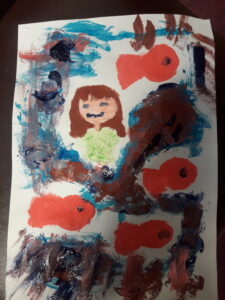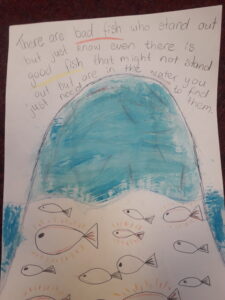Adolescence is a time of challenge and exploration, on the one hand pushing boundaries and on the other trying to explore possible identities for best fit. As a speech and language therapist, I too struggle sometimes on offering a service that is fit for purpose for teenagers who stutter.
I believe in the power of groups for many reasons, not least for reducing the sense of isolation that teenagers I work with have reported. I am currently working with a group of teenage girls that both challenge and frustrate me (they know this 😊).
I love how they challenge me to do better and be a better speech and language therapist. On the flip side they have perfected the eye roll and shrug that I remember from my own teenage years, but they are just so much better at it. For the purposes of this blog post, I will use ‘we’ when it involves work that both the teenagers and I are doing jointly. They have been involved in writing parts of this piece and have reviewed it before giving their approval.
When we had our first meeting we talked together about what our sessions could look like and the recurring theme was that they wanted somewhere to talk about the feelings that they had about stuttering and how they and others talked to themselves about stuttering. Ideas developed from here about minding our language, paying attention to our Ps and Qs.
Over many years they had all completed stuttering icebergs and were familiar with the concept, but we started to look again beneath the waterline and from there into the water that surrounded the iceberg (see Patrick Campbell, 2019). It is important to not only excavate problem-saturated narratives, but to excavate the wider discourses that have at their centre an implicit fluency good stuttering bad, and to challenge the power implicit with these discourses.
So in the past two years I have widened my scope of practice to looking beyond the iceberg at what the water is telling me (Campbell, 2019). I have invited the people I work with to do the same with ever more surprising results. In jointly exploring the context in which we live, we have discovered some surprising things. The water is not always warm or friendly where we think it might be. It is hard to be brave and push boundaries when you cannot see yourself reflected in the literature or media.

Sometimes there are sharks in the water. These sharks can be intimidating or even appear friendly until you realise that the message they send is not one that supports you and your preferred narrative. They can appear pretty and attractive, but send a clear message that the only way is their way. Some can look lovely but cut you with a remark. Their discourse is one of non-acceptance of how you talk, and the subtext is of ‘just’ and ‘if only’ and ‘but’. If you could ‘just’ use a technique or ‘if only’ you took a deep breath before you spoke.
Others swim around and can be oblivious to your floundering (but is ignorance ever an excuse?)

So how do we acknowledge these sharks? How do we address them and relegate their narratives while acknowledging preferred narratives?
How do we resist them? Can one teenager alone see their way through and what if the sharks are close to home? Part of the process for me has been acknowledging that they may even be in the therapy room. That is part of my learning.
As a group we looked at how we all talk about stuttering. In turn this influences how we think about stuttering. The group decided to tackle how to resist negative self-talk and build resilience.
So we have started (and I use we here because it is a collaborative process involving three teenage girls, one speech and language therapist in training and me).
In partnership, we are looking for images and reflections of ourselves in art/literature/media/social media. We have celebrated with cake, one teenager’s one woman stuttering pride day in her secondary school, another’s PowerPoint presentation on mental health difficulties. We discussed how the water can be different if nearly every woman in your family stutters versus no family history at all…
We have watched videos, looked at paintings of people in the moment of stuttering (@paulastonpainter) and listened to podcasts. Stambassador videos for the girl who felt and heard from others that she could not be a science teacher because she stuttered. The speech and language therapist in training has not scored a single assessment, but has learned that for the therapy room to be more open to stuttering the therapist has to be open to seeing stuttering as just another way of talking.
Different but equal.
By Fiona Ryan with support from KH, ME and E
